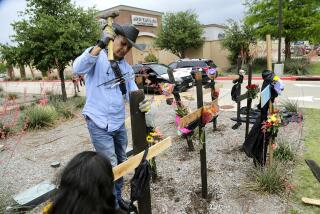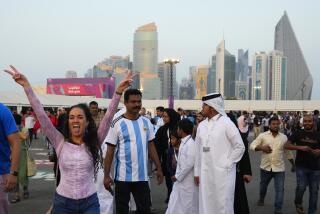They’re Worried About Revenge in Turin : Soccer: Fans remember 1985 riot in Brussels. Mayor had asked to have England-West Germany game moved to Naples.
- Share via
TURIN, Italy — While attending the 1985 European Cup soccer final in Brussels, Dante Grassi witnessed one of sport’s most tragic incidents.
Thirty-nine persons, all but seven of them Italian supporters of Juventus of Turin, were killed and hundreds injured in a riot that Belgium’s courts ruled was instigated by England’s Liverpool fans.
Five years later, England’s national team will play a World Cup semifinal Wednesday against West Germany in Turin’s new Comunale Stadium, Juventus’ home.
Grassi, an architect who is the coordinator of Juventus’ fan club, was asked Monday how he believes the members feel about the presence here of the English and their supporters.
“Completely indifferent,” he said.
But not everyone in Turin, a northern Italian city of 1.3 million, is reacting so complacently. Afraid that English fans again will start trouble in the stadium, Grassi’s two young sons asked him not to attend the game.
Some city government officials, however, are equally fearful of local agitators who have indicated a desire for revenge against the English for the deaths at Heyfel Stadium in Brussels.
Warnings have been spray-painted on stone walls in the city: “Hooligans Beware: We Have Not Forgotten Heyfel,” and “Juventus Comrades, We Will Avenge You.”
Turin’s mayor, Maria Magnani Noya, was concerned enough that she appealed through the media to FIFA, soccer’s world governing body, and the Italia ’90 organizing committee to change the tournament draw so that the English would play their semifinal game against the West Germans in Naples.
That is the site of the semifinal game today between Italy and Argentina. Noya preferred that game for Turin.
In a television interview, she said: “The events involving hooligans in recent days show the danger linked to the presence of these characters in Turin . . . the memory of the tragedy of Heyfel which hit our city could aggravate the danger of the hooligans and unleash a mass reaction.”
La Republica, an Italian newspaper, quoted her as saying: “I am terrified. If FIFA does not do something, it will be war. Nobody here has forgotten Heyfel.” She has since softened her position, but her concern is clear.
A FIFA spokesman, Guido Tognoni, said Monday that the mayor had not contacted FIFA or the organizing committee. He said the sites for the semifinal games would have been switched if a request had been made by the police.
“But the police felt there was no reason to intervene,” he said. “Inside the stadium, we expect no problem whatsoever. Outside, we don’t know.”
Giuseppe Emilio, an aide to the city’s police chief, said Monday that the focus of those involved in security--about 6,000 local, state and military policemen--has been on areas outside the stadium.
He said he does not anticipate a repeat of the Heyfel Stadium tragedy or even of a 1980 incident in Turin involving English and Belgian fans. A European Championship game between their teams was interrupted when police broke up fighting in the stands with tear gas.
There have been no significant disturbances inside stadiums during the World Cup.
Emilio said that police were aware of a meeting between some supporters of Turin’s two Italian League teams--Juventus and Torino--to plan attacks on English fans. But he downplayed the possibility of an organized assault, saying that the meeting was poorly attended.
He said police believe the greatest potential for confrontation is during the hours immediately after tonight’s Italy-Argentina game in Naples.
Italian victories in the World Cup have led to spontaneous, raucous celebrations in the streets of cities throughout the country. If drunken Italian and English fans mix during such a celebration in Turin, Emilio said, violence could result.
That was the case last week in the coastal resort of Rimini, where English and Italian fans clashed after Italy’s 2-0 second-round victory over Uruguay in Rome. Police arrested 246 English fans, who were deported.
In anticipation of a similar eruption here, government officials here and in surrounding towns have extended the ban on the sale of alcoholic beverages to 48 hours to cover both days of the semifinals. The ban usually lasts 24 hours and applies only to the city in which a game is being played.
Emilio said additional security will be employed around the parks that are serving as campsites for English fans who do not have hotel rooms.
“I believe we have anticipated all the problems,” Emilio said. “We will use all measures at our disposal to guarantee order and security. Personally, I am not concerned.”
Except for the incident at Rimini, the Italian police have been able to control the small minority of English fans who came to create havoc. There were some arrests last month on Sardinia, where England played its first-round games, but the island did not turn into the battleground that was expected.
Tognoni was quoted in a London newspaper as saying that FIFA officials would meet after the tournament to consider whether England should be banned from the 1994 World Cup in the United States because of its fans’ behavior, but he later said he was misunderstood.
Other FIFA officials said they are not as irritated by the English fans as they are by the security measures that seem necessary whenever they are present.
With a security force of 5,000, there were no incidents last weekend in Naples, where the English beat Cameroon Sunday in a quarterfinal game, 3-2.
“All was quiet in Naples,” said Kay Coombs, a spokeswoman for the British embassy. “We expect the same in Turin.”
So much attention has been focused on English and Juventus fans that it has virtually been forgotten that the most damaging incident at the World Cup was instigated by West German supporters June 10 in Milan.
Police said that an estimated 1,000 drunken West Germans were involved in rioting as they chased Yugoslav fans through the street near the Gothic Cathedral and the luxury shopping district. Forty-three West Germans were deported, including two who were sentenced to a year in jail upon returning home.
“The organizers here are as much afraid of the Germans as they are the English,” Grassi said. “We are all afraid of what will happen when they meet.”
More to Read
Go beyond the scoreboard
Get the latest on L.A.'s teams in the daily Sports Report newsletter.
You may occasionally receive promotional content from the Los Angeles Times.






